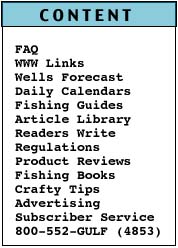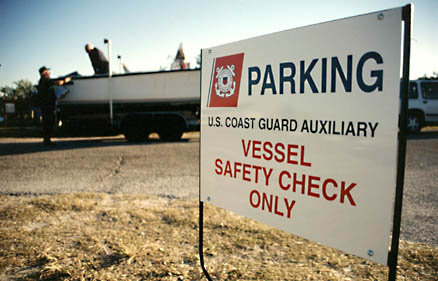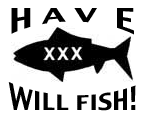
The Saltwater Magazine for Gulf Coast Fishing!
FISHING FORECASTS | FISHING CALENDARS | ARTICLES | SUBSCRIBE
Search Gulf Coast Fisherman's
Web Site
Past articles, specific
places or fish, etc.

Check It Out!
Warmer Weather Means It's Time for an Annual Vessel
Safety Check
by John M. Malatak
Chief, Program Operations
USCG Office of Auxiliary
and Boating Safety Division

There are no penalties for not successfully completing the "check". The goal of the VSC program is to prevent safety-related accidents... |
Car trouble is a common experience for most of us, and with more than 244 million cars on American roads, regular car maintenance has become part of the culture. Surprisingly, this same concept doesn't necessarily translate when it comes to a different mode of transportation-the recreational boat.
Nearly 13 million registered recreational boats take to America's waterways each year and just like a car, boats and other watercraft need a regular check-up to ensure that they are reliable and ready to go when you are.
The U.S. Coast Guard recommends that all boat operators, including those who use personal watercraft, take advantage of a free Vessel Safety Check (VSC) performed annually by a Vessel Examiner from the U.S. Coast Guard Auxiliary or the United States Power Squadrons®.
A VSC is not a law enforcement action. No report to any law enforcement agency is made and there are no penalties for failure. The goal of the VSC program is to prevent safety-related accidents. In addition to checking boats for mechanical safety, these Vessel Examiners verify that required safety equipment is on board and offer valuable advice to boat owners on how to best outfit their vessels to comply with both federal and state regulations. Upon successful completion of the VSC, a decal is issued to the boat for the current year. A VSC decal, displayed prominently, tells us you've taken steps to be in compliance and to boat responsibly.
A Vessel Safety Check is a convenient way for boaters to be sure that the times spent on our nation's waterways are good ones. All too often incidents occur that could have been avoided with a few preventative measures. Before scheduling your VSC, here are some steps you can take to ensure success.
Start with life jackets-one of the most important and basic safety items on board. There should be one U.S. Coast Guard-approved life jacket, of correct size and in good condition, for every person on the boat, so go over your equipment with a critical eye. Are there signs of discoloration, rot, or mildew due to prolonged exposure to the sun or water? Are the seams coming apart or other tears in the fabric that could allow the flotation material to come out? Are the straps, buckles, and zippers in good working condition? Inflatable jackets should be orally inflated and checked to determine if there are any leaks in the air chambers (see the owner's manual on how to do this properly). Also check the CO2 cartridge and firing pin to make certain they are in proper working order.
If children will be on board when the boat is underway, owners/operators should make sure the children's life jackets are Coast Guard-approved and provide a good, snug fit. Loose-fitting life jackets may not keep a child's mouth and nose out of the water, or may come off completely in a sudden plunge.
Take a look at the boat's array of visual distress signals. The type and number should meet U.S. Coast Guard requirements for the area in which the vessel will be operating. If using pyrotechnic devices (flares) check the expiration date. Expired signals may be carried as extra equipment, but cannot be counted toward meeting the Visual Distress Signal requirement, since they may be unreliable.
Owners/operators should also make sure that sound-producing devices, navigation lights, bilge pumps, and ventilation blowers are in good working order. Navigation charts should be on board and updated to the most current editions. Inspect fire extinguisher gauges for proper charge; if you have an installed fire extinguishing system that requires inspection, make sure the date on the tag is current.
These and other required and recommended items, all part of a complete Vessel Safety Check, are listed and explained online at www.vesselsafetycheck.org. While you're logged on, also check out the online copy of Federal Requirements & Safety Tips for Recreational Boaters at the U.S. Coast Guard's Boating Safety website www.uscgboating.org/safety/fedreqs/landing.htm.
The U.S. Coast Guard reminds all boaters to "Boat Responsibly!" For more tips on boating safety, visit www.USCGboating.org.
